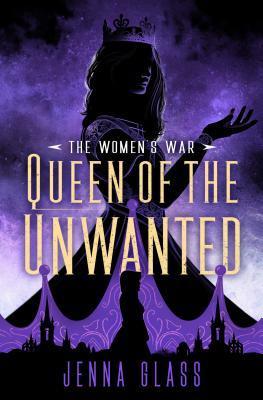
I thoroughly enjoyed The Women’s War by Jenna Glass, but the same cannot be said about its sequel, Queen of the Unwanted. In fact, I did not enjoy the reading of the sequel so much that I did contemplate marking it as a DNF. The only reason I did not do so was the fact that I wanted to give the author a chance to redeem herself and the story. Plus, I skimmed the last seventy-five percent of the novel to minimize the pain. When all else fails, skimming is your friend.
Unlike that first novel, there is so much to dislike in Queen of the Unwanted. First off, Ms. Glass provides no recap or reminder of what happened in the first book. There is nothing to refresh your memory on the numerous characters, the complex politics, and the magic that exists. You have to use context clues for most of it, but clues for how the magic works are few. While I appreciate the fact that the author tried to eliminate what can be a tedious part of any sequel, with the number of characters that narrate and the relative complexity of the world and its magic, to do nothing is a frustrating experience.
Secondly, there is no action throughout the entirety of its 592 pages. The story is literally one political maneuver after another. There is more worry about trade agreements and alliances than anything else in the novel. If I wanted a story about economics and government negotiations, there are plenty of other books that exist that tackle that topic. I do not expect a feminist saga about magic and power to include such mundane topics for so long.
Thirdly, there is absolutely no character development among any of its numerous characters. When I say numerous, I mean it too. If I remember correctly, there are at least seven different narrators around whom the story revolves. Yet, none of them show growth or maturity. All of them are jockeying for power in some fashion, but no one seems to be learning anything.
Lastly, as the narrators are solely in the upper echelons of their respective cultures, we never see how their decisions impact their citizens. We get hints that some of their policy decisions are not popular or have devastating effects for the lower classes, but we only see this world through its leaders. I am not a fan.
While the first novel was a fantastic example of feminist literature, there again is another area in which Queen of the Unwanted leaves me wanting. The only truly feminist idea in the novel is that it shows that women can lead a country as well as, or better, than men. Unfortunately, we don’t really see these female leaders do much of anything except negotiating political marriages for themselves or for others. Plus, we see the two other female leaders fight amongst themselves for power, showing the very same dangerous female relationships that any working woman will understand. The use of marriage as a political gambit does not feel very feminist to me, and no one wants to see yet another example of toxic female coworker relationships. So, the very thing which made The Women’s War so impressive is practically nonexistent in the sequel.
Sequels tend to get a bad reputation for not being as strong or good as its predecessor, but rarely have I come across a sequel that is almost its predecessor’s opposite, as is the case with Queen of the Unwanted. I remain shocked that a sequel could turn its back on everything which made the original story so good. The lack of action, the absence of character development, the missing recaps to tie the two stories together – they call combine to create a reading experience best avoided. After all, there are plenty of good books out there more worthy of your attention.
